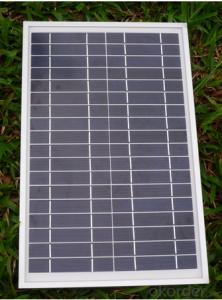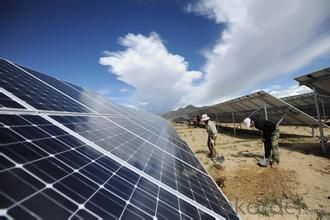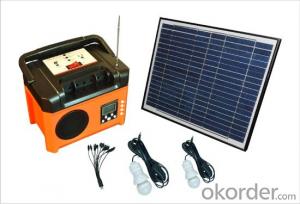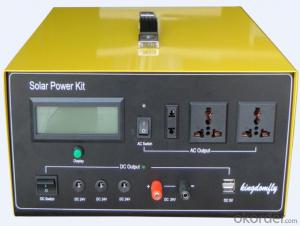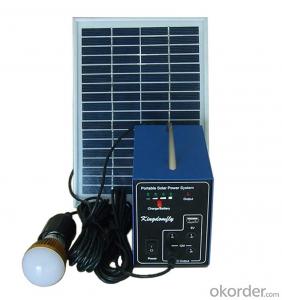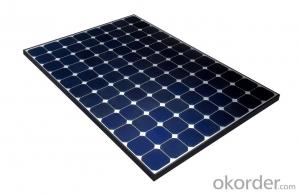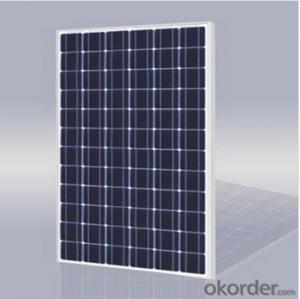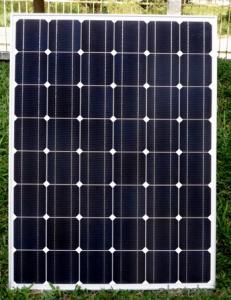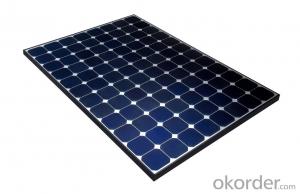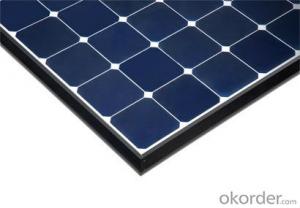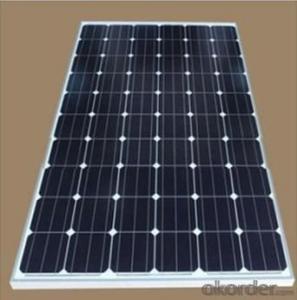300kw CNBM Monocrystalline Silicon Solar Energy Systems Panel for Home Use in Anaheim, CA
- Loading Port:
- Shekou
- Payment Terms:
- TT OR LC
- Min Order Qty:
- 100 watt
- Supply Capability:
- 1000 watt/month
OKorder Service Pledge
OKorder Financial Service
You Might Also Like
Specification
300KW CNBM Monocrystalline Silicon Panel for Home Using
Production description
Solar power is the conversion of sunlight into electricity, either directly using photovoltaics (PV), or indirectly using concentrated solar power (CSP). Concentrated solar power systems use lenses or mirrors and tracking systems to focus a large area of sunlight into a small beam. Photovoltaics convert light into anelectric current using the photovoltaic effect.[1]
Solar energy is radiant light and heat from the Sun harnessed using a range of ever-evolving technologies such assolar heating, photovoltaics, solar thermal energy, solar architecture and artificial photosynthesis.
It is an important source of renewable energy and its technologies are broadly characterized as either passive solar oractive solar depending on the way they capture and distribute solar energy or convert it into solar power. Active solar techniques include the use of photovoltaic systems,
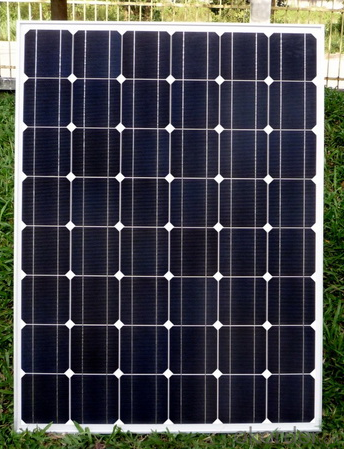
Feature
1.High conversion efficiencies resulting in superior power output performance.
2.Outstanding power output even in low light or high temperature conditions
3.Optimized design for ease of soldering and lamination
Physical characteristic
1. Rigorous quality control meets the highest international standards.
2. High-transmissivity low-iron tempered glass, strong aluminium frame.
3. Using UV-resistant silicon.
4. IS09001/14001/CE/TUV/UL
packaging
26pcs in one carton 6pallets in 20foot container 14pallets in 40 foot container.
- Q: What are the components of a solar energy system?
- A solar energy system consists of several key components that work together to harness the power of the sun and convert it into usable electricity. The main components of a solar energy system include: 1. Solar Panels: These are the most recognizable element of a solar energy system. Solar panels, also known as photovoltaic (PV) panels, are made up of multiple solar cells that convert sunlight into direct current (DC) electricity. They are typically mounted on the roof or ground to capture sunlight. 2. Inverter: The DC electricity generated by the solar panels needs to be converted into alternating current (AC) electricity, which is the type of electricity used in homes and businesses. An inverter is responsible for this conversion process, ensuring that the electricity can be used by various appliances and devices. 3. Mounting System: Solar panels need to be securely mounted on rooftops or on the ground. The mounting system consists of racking or frames that hold the panels in place and allow for optimal sunlight exposure. The mounting system also ensures that the panels are installed at the correct angle and orientation to maximize energy production. 4. Electrical Wiring: Proper electrical wiring is crucial to connect the solar panels, inverter, and other components of the solar energy system. The wiring carries the electricity from the panels to the inverter, and then to the electrical panel of the building, where it can be distributed and used. 5. Batteries (Optional): In some solar energy systems, batteries are included to store excess electricity generated during the day for use during the night or during periods of low sunlight. These batteries store the excess energy and release it when needed, allowing for a more consistent and reliable power supply. 6. Monitoring System: Many solar energy systems come with a monitoring system that allows users to track the performance and energy production of their system. This can be done through a web-based platform or a smartphone app, providing real-time data on energy generation, consumption, and savings. 7. Grid Connection (Optional): Solar energy systems can be connected to the electrical grid, allowing excess electricity to be fed back into the grid when the system produces more energy than is being used. This is known as net metering, and it allows homeowners to earn credits or receive compensation for the excess energy they generate. Overall, a solar energy system is a complex and interconnected set of components that work together to harness the sun's energy and convert it into usable electricity for various applications. These components enable individuals and businesses to reduce their reliance on traditional fossil fuel-based energy sources and contribute to a cleaner and more sustainable future.
- Q: Are there any disadvantages of solar energy systems?
- Yes, there are a few disadvantages of solar energy systems. Firstly, the initial installation cost can be high, making it less accessible for some individuals or communities. Secondly, solar panels require a large surface area to produce a significant amount of energy, which might be challenging in urban or limited space environments. Additionally, solar energy generation is dependent on sunlight, so it may not be as reliable during cloudy days or at night without the use of storage systems. Finally, the production and disposal of solar panels can have environmental impacts, particularly if not handled properly. However, despite these drawbacks, the benefits of solar energy, such as its renewable nature and reduced environmental impact, outweigh the disadvantages, making it a viable and increasingly popular energy option.
- Q: Can solar energy systems be used in areas with limited access to solar energy conferences and expos?
- Yes, solar energy systems can definitely be used in areas with limited access to solar energy conferences and expos. The availability of conferences and expos may provide valuable information and networking opportunities, but they are not essential for the successful implementation and usage of solar energy systems. With the right resources and expertise, communities and individuals can still benefit from solar energy systems, even without direct exposure to conferences and expos.
- Q: Can solar energy systems be used in powering beauty salons or spas?
- Yes, solar energy systems can certainly be used to power beauty salons or spas. Solar panels can be installed on the roofs or other available spaces of these establishments to generate electricity from sunlight. This renewable energy source can then be used to power various equipment, lighting, heating, and cooling systems within the salon or spa. By utilizing solar energy, these businesses can reduce their reliance on the grid, lower their energy costs, and contribute to a more sustainable and environmentally-friendly operation.
- Q: Can solar energy systems be used for powering off-grid agricultural processing facilities?
- Yes, solar energy systems can be used to power off-grid agricultural processing facilities. Solar panels can generate electricity from sunlight, which can be used to operate various machinery and equipment required for processing agricultural products. This renewable energy source is cost-effective, environmentally friendly, and can provide a reliable power supply in remote areas without access to the traditional power grid.
- Q: How do solar energy systems affect the environment?
- Solar energy systems have a significantly positive impact on the environment. They are a renewable and clean source of energy, which means they do not produce harmful emissions or contribute to air pollution. This reduces the overall greenhouse gas emissions and helps combat climate change. Additionally, these systems do not require water for operation, unlike traditional fossil fuel power plants, reducing water scarcity issues in certain regions. Furthermore, solar energy systems have a minimal impact on land use. Rooftop solar panels can be installed on existing structures, maximizing the use of space and minimizing the need for additional land. Moreover, solar farms can be constructed on marginal or unused land, without disrupting natural habitats or valuable ecosystems. Solar energy systems also have a positive effect on human health. The reduction in air pollution and emissions from traditional energy sources leads to improved air quality, resulting in fewer respiratory and cardiovascular diseases. This, in turn, reduces healthcare costs and improves overall well-being. Another significant advantage of solar energy systems is their potential to create jobs and stimulate economic growth. The installation, maintenance, and manufacturing of solar panels require a skilled workforce, leading to the creation of new employment opportunities. Additionally, investing in solar energy infrastructure can help diversify the energy sector, reducing dependence on imported fuels and increasing energy security. While solar energy systems offer numerous environmental benefits, it is important to consider their potential challenges. The production and disposal of solar panels can have some environmental impact, primarily due to the use of certain materials during manufacturing. However, advancements in technology and recycling programs are continuously reducing these concerns. In conclusion, solar energy systems have a positive influence on the environment by reducing greenhouse gas emissions, minimizing air and water pollution, conserving land resources, improving human health, and stimulating economic growth. As we transition towards a more sustainable future, solar energy will play a crucial role in mitigating climate change and protecting the environment.
- Q: Can solar energy systems be used for recreational vehicles or boats?
- Yes, solar energy systems can be used for both recreational vehicles and boats. These systems are commonly used to power various appliances, charge batteries, and provide electricity for lighting and other electrical needs while on the move. Solar panels can be easily installed on the roof or any other suitable surface of the vehicle or boat, allowing for sustainable and renewable energy generation.
- Q: Can solar energy systems be used during power outages?
- Yes, solar energy systems can be used during power outages. They can provide a reliable source of electricity as long as they are equipped with a battery storage system to store excess energy generated during the day. This stored energy can then be used to power essential appliances and devices during power outages, ensuring continuous electricity supply.
- Q: Can solar energy systems be used in areas with limited access to distribution networks?
- Yes, solar energy systems can be used in areas with limited access to distribution networks. This is because solar energy systems can operate independently, generating electricity from sunlight and storing it in batteries for use when needed. This makes them a viable and sustainable solution for areas without reliable access to power grids or distribution networks.
- Q: Are there any tax credits available for solar energy systems?
- Yes, there are tax credits available for solar energy systems. The federal government offers a solar investment tax credit (ITC), which allows homeowners and businesses to deduct a percentage of the cost of installing a solar energy system from their federal taxes. Additionally, some states and local governments also offer their own tax credits or incentives for solar installations.
Send your message to us
300kw CNBM Monocrystalline Silicon Solar Energy Systems Panel for Home Use in Anaheim, CA
- Loading Port:
- Shekou
- Payment Terms:
- TT OR LC
- Min Order Qty:
- 100 watt
- Supply Capability:
- 1000 watt/month
OKorder Service Pledge
OKorder Financial Service
Similar products
Hot products
Hot Searches
Related keywords
